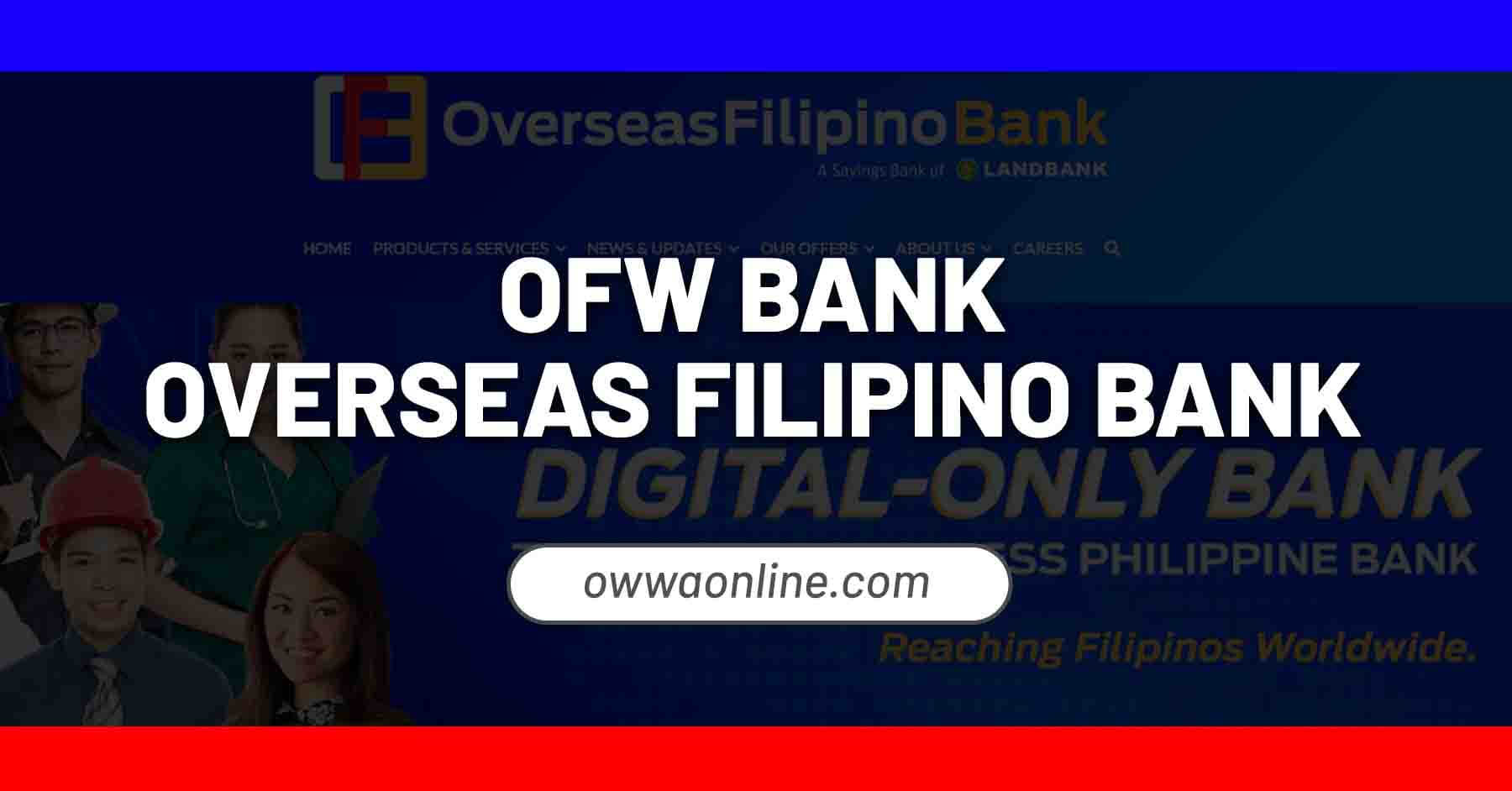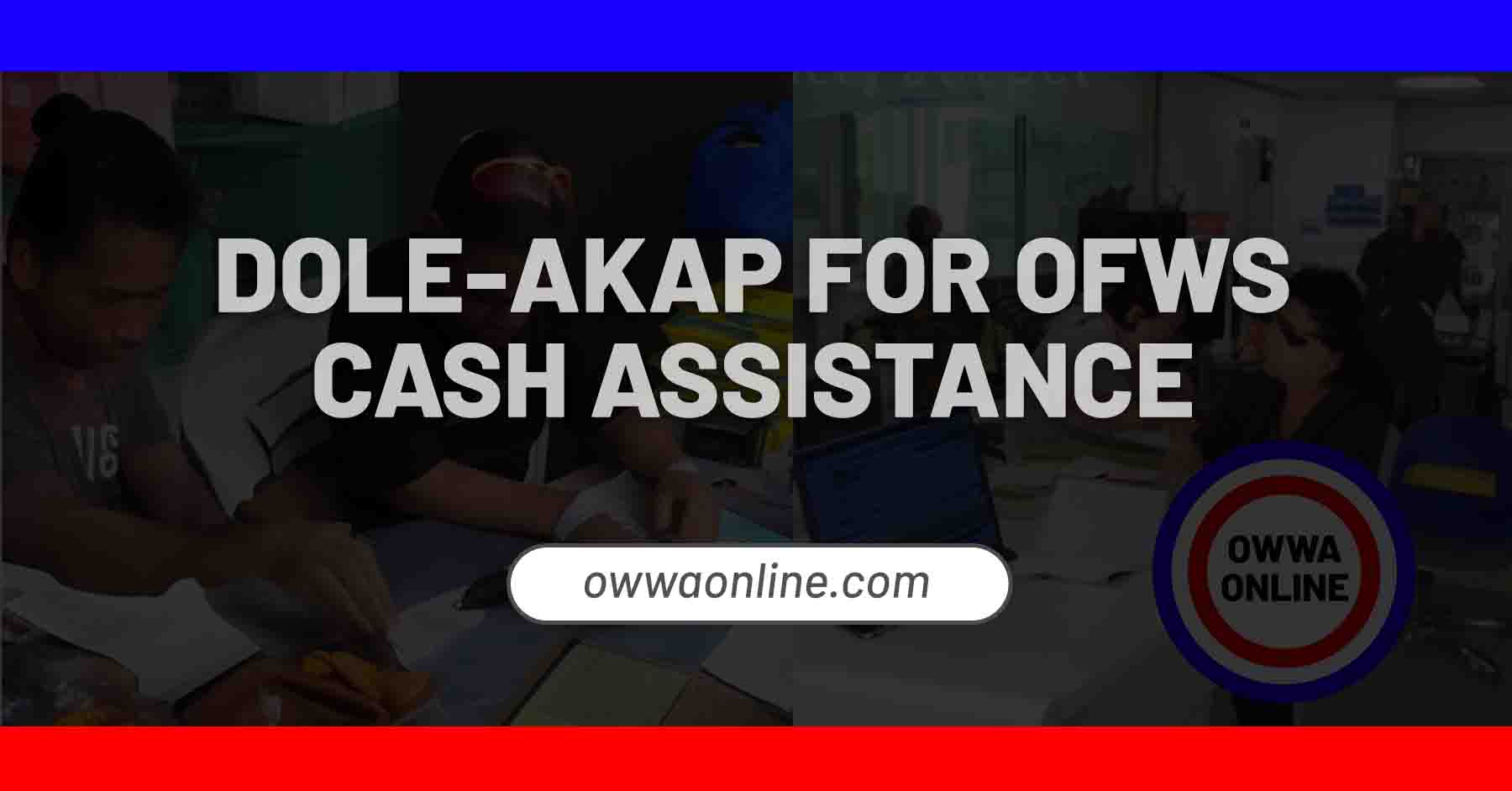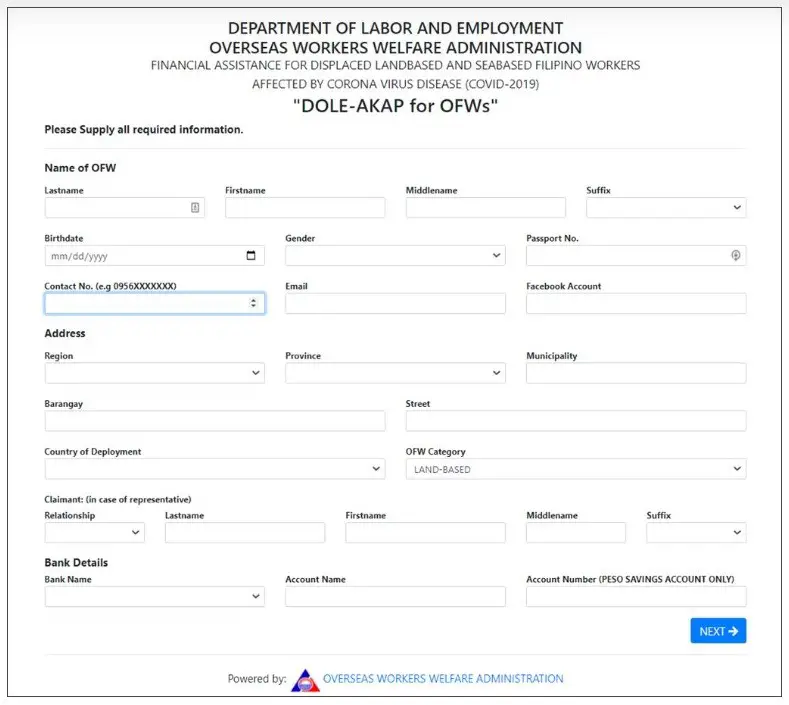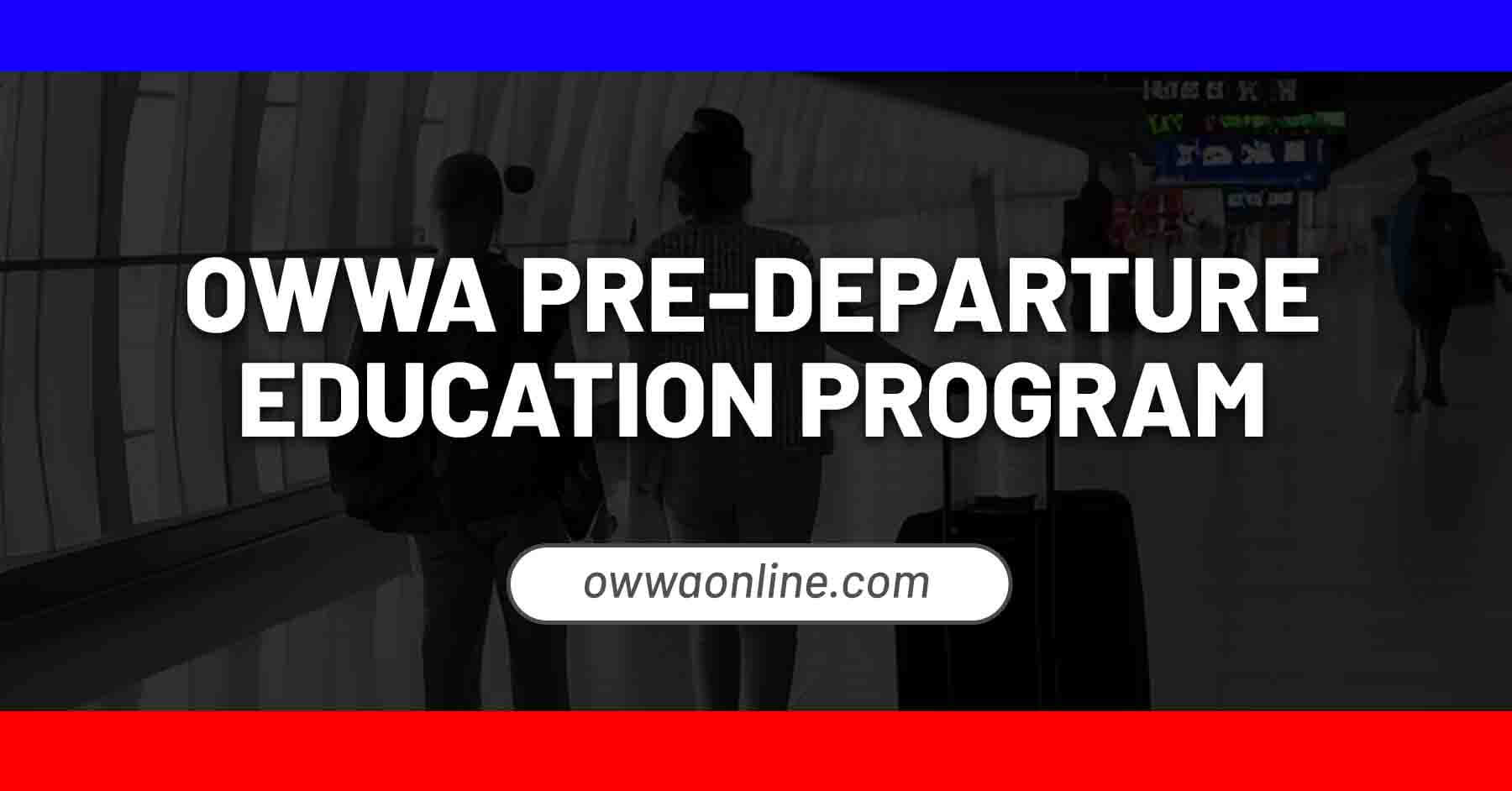The Overseas Filipino Bank, otherwise known as OFBank, is the first officially authorized digital-only bank in the Philippines. It is a wholly owned branchless subsidiary of the Land Bank of the Philippines (LBP), and was designed to offer fast, safe, and cost-effective products and services especially tailored for Overseas Filipino Workers (OFWs) without even visiting any physical branches.
Originally founded in 1906 as the Philippine Postal Savings Bank (PPSB) or Post Bank, it was acquired by the Land Bank of the Philippines (LBP) and converted into what is now known as OFBank—the 16th largest thrift bank and the smallest of the three state-owned banks in the Philippines. So, if you are an OFW looking for a comprehensive banking solution that can cater to your needs as an OFW, then you can look into what OFBank has to offer. Through this article, you can also learn more about what sets it apart from all the other Philippine banks aside from its digital-only platform, convenient, artificial intelligence-powered banking transactions.
What is OFBank
OFBank is a digital-only bank exclusively designed by the Land Bank of the Philippines (LBP) to offer products and services to OFWs and their families and beneficiaries. It is well known for being a trailblazer when it comes to AI-powered banking, Digital Onboarding System with Artificial Intelligence (DOBS AI), and electronic know-your-customer (e-KYC) processes.
OFBank History
As far as history goes, OFBank started out in 1906 as the Philippine Postal Savings Bank Inc. (PPSB). It stopped operating in 1976 and re-opened as Philippine Postal Savings Bank Inc. (PPSB) under the Philippine Postal Corporation (PPC) by virtue of the Republic Act No. 7354. As PPSB, it offered domestic and international remittance services and loans to microfinance institutions.
In 2016, Landbank or LBP acquired the re-opened Post Bank and in 2017, by virtue of then-president Rodrigo R. Duterte’s Executive Order No. 44, rebranded it into the new OFBank—the first state-owned branchless bank that offers fast, safe, convenient, and cost-effective remittance services, credit facilities, and financial assistance to OFWs and their families and dependents. In 2020, the Bangko Sentral ng Pilipinas (BSP) issued Circular No. 1105 on The Guidelines on the Establishment of Digital Banks which paved the way for OFBank’s establishment as a digital bank. In 2021, OFBank officially announced its intention to be licensed as such while operating as a thrift bank. In June 2021, OFBank officially launched as the country’s first branchless and digital-centric government-owned bank.
To date, OFBank continues to fine-tune its systems and processes while expanding its operation as a digital bank during the first of the three-stage licensing framework set by the BSP. For now, it offers a digital reach spanning 112 countries with accessible services provided by 763 merchants—including 124 utility and service companies, 186 educational institutions, 277 government agencies and local government units (LGUs), 140 cooperatives/associations/foundations/corporations, 20 hospitals/healthcare/clinics, and 16 banks, credit card companies and insurance companies.
OFBank Mission
OFBank, as the first digital-only, branchless Philippine bank, strives to be a convenient, reliable, and secure bank that offers solutions tailor-made to the long-term needs of Overseas Filipinos, OFWs, their beneficiaries, and other stakeholders through strategic alliances and partnerships.
OFBank Vision
For its vision, OFBank hopes to be the leading OFW-centric branchless, digital bank in the Philippines offering competitive, reliable, and innovative products and services in the country by 2024.
Benefits of Banking with OFBank
The following are some of the benefits offered by OFBank to the OFWs and their dependents:
For both senders and recipients:
- OFBank offers the most efficient and affordable remittance options.
- OFBank offers an easy-to-use, fast, and safe OFBank Mobile Banking App (MBA) for digital banking.
- The bank intends to gradually reduce the cost of OFBank remittance and increase the government’s position in the remittance industry.
For OFWs and their dependents:
- OFBank offers improved lending facilities and financial assistance designed to meet both personal and business needs.
- Provide the most effective, accessible, affordable, fast, and safe remittance method for both senders and recipients.
- Offer enhanced credit facilities and financial assistance for OFWs and their families enterprise development and personal needs.
- Convenient and secure electronic know-your-customer (e-KYC) process for its online account opening through its Digital Onboarding System with Artificial Intelligence (DOBS AI).
OFBank Products and Services
The OFBank offers numerous digital products and services that includes a Digital Onboarding System with Artificial Intelligence (DOBS-AI), an AI-powered system which allows real-time opening and verification of a mobile banking deposit account on any supported iPhone or Android devices.
Aside from this trailblazing AI technology, OFBank also offers the following products and services to Overseas Filipinos, OFWs, and their dependents.
Deposits
- OFBank Visa Debit Card
This is a Peso savings account exclusively created for Overseas Filipinos (OF) and Overseas Filipino Workers (OFW). It allows sending of remittances via Visa Direct through any Visa partners abroad.
- OFBank Regular Debit Card
This is an interest-bearing Peso savings account especially for OF or OFW beneficiaries who are between 7 and 18 years old.
- OFBank Debit Beneficiary Card
This is a Peso savings account for OF or OFW beneficiaries who are 18 years old and above. Using this card, you can transfer funds to any OFBank or LANDBANK ATM accounts for free.
Loans
- OFW Reintegration Program
This is a resulting credit assistance program from the collaboration between Landbank and the Overseas Workers Welfare Administration (OWWA). It was designed to help provide business opportunities to Overseas Filipino Workers (OFWs) as an alternative to overseas employment.
- Multi-Purpose Loan
At this time, OFBank is yet to launch its own loan offering. In the meantime, they offer multiple financial assistance for capital building or operational expansion through the lending programs of their parent bank—Landbank.
- Loans to Farmers & Fishers
Landbank offers financial assistance to help finance ventures in agribusiness, be it for additional capital, production increase, or operational expansion.
- Housing Loans
Landbank offers housing loans via the Landbank Housing Opportunities Made Easy (HOME) Program—a lending program created for both homebuyers and home developers.
- Business Loans
Landbank also supports entrepreneurs through its various lending programs. With its presence in all of the 81 provinces nationwide, entrepreneurs are given the support they need to start or expand their existing business wherever they are in the country.
- Bahay para sa Bagong Bayani (3B)
A special lending program exclusively designed for Overseas Filipino Workers (OFWs) so they can acquire, build, or renovate their homes at relaxed and flexible terms.
Treasury
- Premyo Bonds Para sa Bayan
A special OFBank investment program where participants who invest in bonds get one (1) Premyo bond unit for every Php500.00 placement. Each Premyo Bond unit entitles the bondholder to one electronic rewards number (e-RN).
Remittance
The OFBank offers the following options to send and receive money:
- “Transfer to Anyone” option on the Landbank/OFBank Mobile Banking Application (MBA)
Transfer funds via the Landbank/OFBank Mobile Banking App, choose “Transfer to Anyone”, enter the destination account number you wish to send money to, and key in the amount you wish to transfer.
- Via Instapay/Pesonet
If you wish to make real-time fund transfers from any local Philippine Bank or e-wallet like GCash and Paymaya, then you want the option to transfer funds via Instapay. If you have the luxury of waiting 1-3 days, then you may opt for Pesonet transfers.
To do so, choose “Landbank” as the destination bank and input the 10-digit OFBank account number.
- Send money via Visa Direct
If you are sending money from your bank abroad, you may access the OFBank remittance service through an Internet/mobile banking account or ATM. Simply enter the recipient’s 16-digit Visa card number and the amount you want to send. Note: This service is not available if you are using the OFBank Regular Debit Card.
- Through overseas Remittance Centers
If you are sending money from overseas via overseas remittance centers, then you will need the following information:
- Name of Account Holder
- 10-digit Account Number
- Name of Bank: Landbank Of The Philippines, not OFBANK
For a list of the OFBank partner agencies, you may visit: https://www.landbank.com/remittance/remittance-partners. The transfers will be credited to the OFBank account in real time. For non-partners, the remittance will be credited according to their regular remittance processes
- Transfer funds from your account through your foreign bank account.
You may also use your foreign account to send money to your OFBank account. Simply instruct your bank to remit to the OFBank account with the following information:
- Name of Account Holder
- 10-digit Account Number
- Name of Bank: Landbank Of The Philippines, not OFBANK
- SWIFT CODE: TLBPPHMMXXX
E-Banking
- Retail Internet Banking
Using the OFBank Internet Banking Channel, you may manage your OFBank account in a convenient, reliable, and safe manner.
- Alternative Payment Channel
Paying the bills and any other financial obligations can also be done easily using the OFBank e-payment facility.
- OFBank Mobile Banking App
The OFBank Mobile Banking Application (MBA) is a free application that offers convenient access to a wide array of services including the following:
- Online Account Opening
- Quick Balance
- Fund Transfer to own, anyone and other Banks
- Bills Payment
- Cardless Withdrawal
- Mobilock
- Purchase Treasury Bonds
- Loan Application
- One-time Pin (OTP)
- Contact Us
Others
- Leasing Facility
OFBank also offers a lease-to-own facility where the LLFC (Lessor) acquires an asset directly from a third party (usually the supplier or manufacturer) and leases it out to the OFBank client (Lessee).
Requirements to Open an Account with OFBank
If you plan to open a bank account with OFBank, here are the requirements you need to prepare:
- Stable and secure Internet connection
- Active email address
- Active mobile numbers
- For scanning and verification purposes: Any one (1) valid identification (ID) card from the list below:
- For Overseas Filipinos and Overseas Filipino Workers:
- Passport
- PRC ID
- UMID
- For Beneficiaries:
- Company ID
- Driver’s License
- GSIS ID
- OFW ID
- OWWA ID
- Passport
- Postal ID
- PRC ID
- School ID
- Senior Citizen ID
- SSS ID
- UMID
- Voters’ COMELEC ID
- For Overseas Filipinos and Overseas Filipino Workers:
Note that you need to check that the information you enter in the application matches the information on the ID you are presenting.
How to Open an OF Bank Account Online – Step by Step
If you are an OFW or one of their beneficiaries and you wish to experience for yourself what the hype regarding OFBank is all about, here’s the complete procedures on how to open an account:
- Download the OFBank Mobile Banking App from the App Store (if you are an iOS user) or Google Play (if you are an Android phone user)
- Type and search “OFBank” from Google Play or Apple App, depending on the type of phone you use.
- Download and install the MBA version in your smartphone for free.
- Once downloaded, click on the OFBank MBA icon.
- Click on “I Agree” after reviewing the Terms and Conditions.
- Once installed, open the OFBank Mobile Banking App by clicking on the app icon.
- On the Login screen, key in your login credentials (user ID and password).
- Click “Continue” on the welcome screen.
- On the reminders page, choose the relevant description for you (whether you are an OFW, an Overseas Filipino, or a beneficiary).
- Click “Proceed.”
- Click “Confirm” to verify that you have read and accepted the Terms and Conditions Agreement.
- Enter the required information in the section labeled “Profile Details.”
- To confirm the nominated mobile number registered to your account, enter the one-time PIN (OTP) then press “Submit.”
- Verify your email address, by enter the one-time PIN (OTP) then pressing “Submit.”
- Once verified, create a user profile and choose your password.
- Continue by selecting Security Questions and Answers and then clicking the “Next” button.
- Input your personal, financial, and account information.
- Upload your valid ID.
- Take a selfie and upload it as well.
- Review the information that has been provided and click “Confirm.”
- Check your email for a confirmation to see if you have successfully created an OFBank account.
Video: How to Open an Overseas Filipino Bank (OFBank) Account Online
If you want to open an Overseas Filipino Bank (OFW) account but you want an easy and convenient procedure to follow along with, you should be able to open an account online when you check out this explainer video posted by Landbank Official’s YouTube channel:
Frequently Asked Questions
If you have any further questions regarding OFBank and its features, products, and services, you may check out this list of frequently asked questions and answers:
1. What is OFBank?
OFBank stands for Overseas Filipino Bank. It is the country’s first-ever state-owned digital-only branchless subsidiary of the Landbank of the Philippines (LBP).
2. What is the purpose of OFBank?
The OFBank was especially designed to offer Overseas Filipino Workers (OFWs) and their beneficiaries fast, safe, and convenient banking options, secure financial products and services, and cost-effective international remittance services.
3. What types of accounts does OFBank offer?
The following are deposit accounts offered by OFBank to overseas Filipinos, OFWs, and their families and beneficiaries:
- OFBank Visa Debit Card for Beneficiaries
- OFBank Regular Debit Card for Beneficiaries
- OFBank Visa Debit Card for Overseas Filipinos and Overseas Filipino Workers
4. Do I have to submit a hard copy of my ID card?
No. A photo of the applicants’ ID will only be required to be submitted online via the OFBank Mobile Banking App during the account opening application procedure.
5. How do I send money to my beneficiary’s LANDBANK or OFBank account?
If you have a Landbank or an OFBank account, you may use the OFBank Mobile Banking App to transfer money to your beneficiary’s Landbank or OFBank ATM without paying a fee. Otherwise, you may use your bank’s app and transfer to the destination Landbank or OFBank account via Instapay or Pesonet.
6. What should I do if my OFBank credit card was lost or stolen?
In case you lose your OFBank debit or credit card, you may reach out to OFBank by calling the OFBank Customer Care Hotline at (+632) 8-405-7000. You may also call the PLDT Domestic Toll Free number at 1-800-10-405-7000 to report the situation right away. In case you can’t call, you may also send an email to customer.care@mail.ofbank.com.ph.
Additionally, you can also instantly block your card via the iAccess online banking service available at the Landbank website at https://www.lbpiaccess.com.
Summary
The Overseas Filipinos (OF), migrant workers, and their beneficiaries have always been one of the most protected members of Philippine society. On top of the numerous agencies looking out for their safety and well-being, there are a lot of institutions that are being groomed to help address their needs—financial, social, or otherwise. Now that the world has evolved into the Internet age, things are pretty much the same, except the transactions are mostly carried out online.
In an effort to match the evolving needs of the OFWs and their families, the OFBank was created with their convenience in mind. In fact, we have already designed a much simpler way to get access to digital banking options and other important financial services like remittances and loans—to quickly and securely create a bank account online.
It was meant to be a “milestone” in the country’s banking history meant to “help the Philippines leapfrog to the digital economy” through modernization and expansion of its services
Contact Information
Overseas Filipino Bank (OFBank)
Office Address: OFBank Center Liwasang Bonifacio, Ermita, Manila, 1000
Email address: customer.care@mail.ofbank.com.ph
Telephone Number: (02) 8-405-7000 or 1-800-10-405-7000 (PLDT Domestic Toll Free)
OFBank’s website: https://www.ofbank.com.ph



